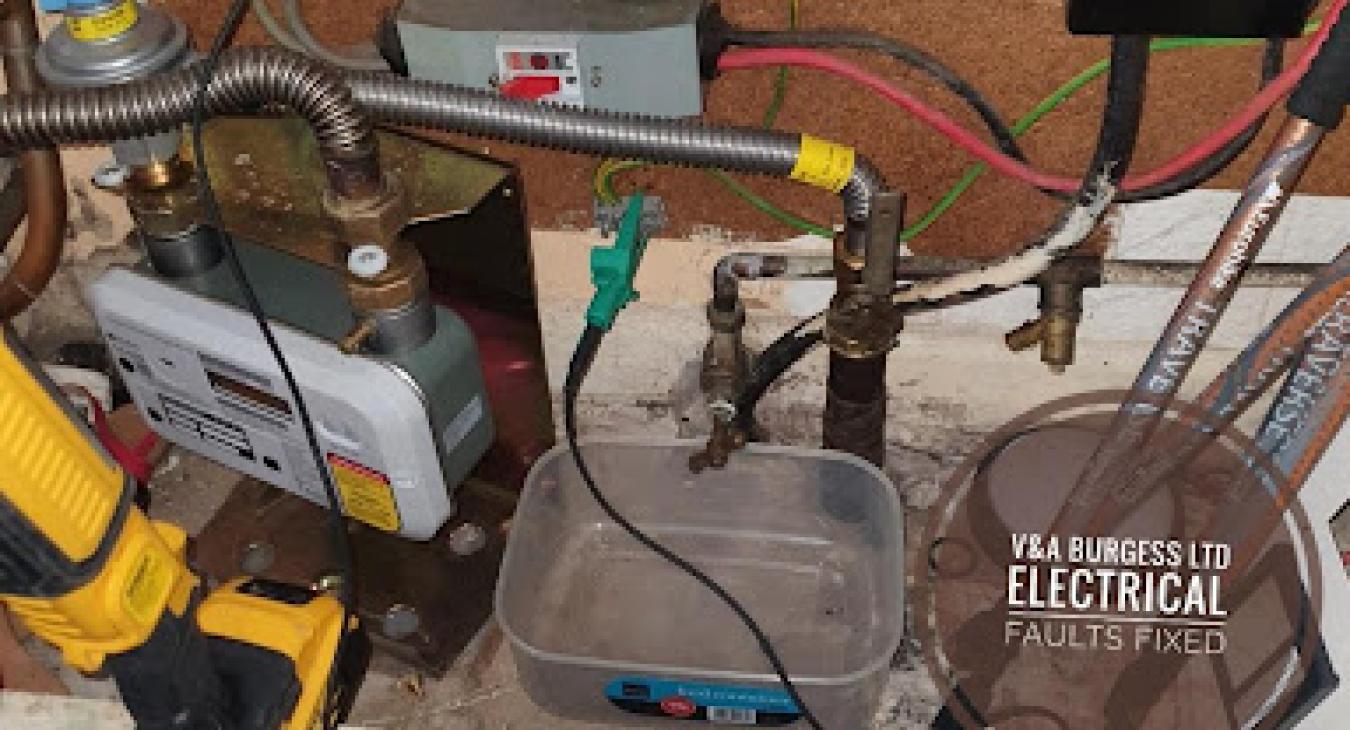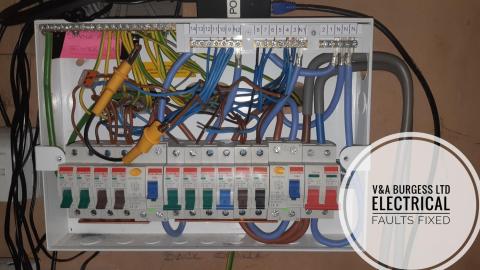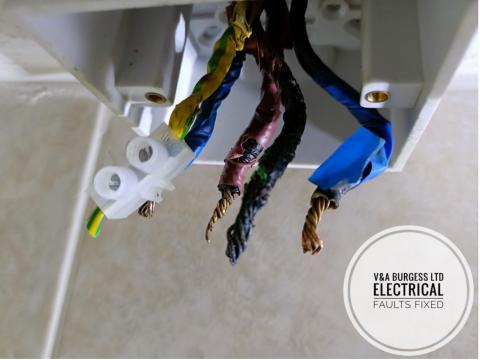
Table of Contents
- "When is it time to rewire my house?" - A common question we are presented with as electricians operating in Warrington & Liverpool.
- What does an inspection tell us?
- Are there any signs that my home may need a rewire?⚡
- Will I have to move out of my house for a rewire?
- What affects a rewire cost?
- Typical Costs💷
1) "When is it time to rewire my house?" - A common question we are presented with as electricians operating in Warrington & Liverpool.
Rewiring a home can be a long project and a great expense. The process usually involves channelling out walls and drilling holes to feed cables around the home providing power to all areas. A wiring system when installed can provide usable service for many decades and in fact, many wiring systems if maintained and not overly interfered with can last for 50+ years!
There are occasions when an electrician can determine if a rewire is necessary simply by looking at the electrical installation and perhaps removing a socket, switch or two. This tends to be when the electrical system is very old and contains visibly old and aged cables such as rubber sheathed or lead sheathed cabling. In most electrical installations, in order to determine the condition of the installation and its suitability for continued use, an EICR will need to be carried out.
Back to top2) What does an inspection tell us?
A periodic electrical inspection will involve many electrical tests on all circuits of the installation. These tests will give results that allow your electrician to interpret the condition of the installation. There is much more information on our site about electrical inspections (also known as safety electrical checks, EICR, Landlord certificate and homebuyer electrical check). This information can be found here:
https://www.electricalfaultsfixed.co.uk/electrical-safety-checks-eicr
3) Are there any signs that my home may need a rewire?⚡
There can be signs that your home needs rewiring such as:
- A really old Fusebox – modern consumer units have trip switches installed and are much larger than older fuse boxes. Some old fuse boxes have had a “trip switch upgrade” but they are still an incredibly old unit and offer little protection, in most cases, from electric shock and arc faults.
- Sockets mounted in the skirting board – This was a practice carried out many decades ago. Sockets mounted in a skirting board are no longer considered safe, practical, or convenient especially for somone struggling with mobility or back pain.
- Single sockets in each room – Houses were wired with single sockets in each room a long time ago when we had little use for electricity and the only item of equipment in each room may have been a table lamp or floor standing lamp. It is a sign that your electrical system may be old. Adding more and more sockets to an old electrical system is not often considered safe and many upgrades may need to take place in order to bring the system up to modern standards.
- Overuse of extension leads – A reliance on extension leads to provide all the plug socket outlets that you require is a sign that you really should have more plug sockets installed and may need a rewire. It is not safe to use extension leads as a permanent solution to a lack of plug sockets and can lead to overheating, overloading and possible fire risk.
- Flickering Lights – There can be many reasons for flickering lights and this issue could be nothing serious but it should be investigated by an electrician to check the wiring age and condition.
- Bedroom light is close to a window – This was a wiring practice carried out several decades ago but not anymore. It is a potential sign that your wiring installation is old and should be inspected by an electrician if an inspection has not been carried out in the last 10 years.
There are other signs that your home may need a rewire but the best course of action is to consult with your electrician if you are thinking “WHEN IS IT TIME TO REWIRE MY HOUSE” as your local professional electrician will be best placed to advise you. Don’t forget that you don’t have to take the first opinion from anyone. If, however, two or three professionals are saying similar things to you then its best to go with their advice. 😊
Back to top4) Will I have to move out of my house for a rewire?
There are some electricians that will rewire your house with you still living there and some that will not. A rewire is messy, disruptive, and noisy and not a pleasant situation to live around. We vastly prefer to rewire a house that is absolutely empty of people and furniture for this reason and will often refer customers on to another company if they prefer to stay in their home for this type of building work. One of the biggest issues we face for customers living in an occupied rewire is getting power back on to all circuits, each and every day. We will have to move furniture, possessions, and floor coverings, sometimes several times a day in order to achieve what is needed to rewire the property. Extra cleaning and dust proofing takes extra time and creates more work. Living in an occupied rewire often works out more expensive for the job, so much so that often it is cheaper to go on holiday for the time whilst the rewire is carried out! - Sounds like an easy choice to me!😊
Back to top5) What affects a rewire cost?
Typically, several thousand pounds. There are of course many variable that affect the cost and these are all factored in by your electrician when producing a quote. These can be things such as:
- Access to the site and parking - Better access to the work site can speed the job up and ensure that no time is wasted back and forth to the van for materials and tools. There are an extraordinary number of visits paid to a van during a tradespersons working day and having to park far away from the work site is an absolute pain for most tradespeople. Having a large drive or lots of available parking around the property is a definite plus for keeping costs down.
- The size of the property - The larger the property, the longer the cable runs that are likely to be required along with the number of electrical circuits and this will increase costs as you may expect. Very large properties or those with particularly high current demands may, in some cases, require an upgrade to the incoming mains supply in order to efficiently power the home. This increases costs drastically.
- The number of electrical points required by the customer - When working out what you would like and where, bear in mind that a fabulous kitchen lighting scheme requiring 18 downlights, under cabinet lighting and floor lighting with smart home integration is likely to require much more work from your electrician along with materials. This will increase costs.
- Plastering and decoration costs need to be considered - Older properties where plastering work is very old can occasionally show problems when walls and ceiling are disturbed. Old plaster can easily be damaged or fall of when the slightest of disturbances occurs and rewiring a property is likely to lead to issues with old plasterwork. This will require plasterers and decorators to attend following a rewire in some cases to make good or as part of a renovation program for your home.
6) Typical Costs💷
Rewiring a 3-bed semi-detached property on average can cost between £6000 and £7000 pounds (2023). Rewiring a 4-bed detached house could cost between £6700 and £8000 pounds. Rewiring a small terraced property could be between £5400 and £6500. As above, various factors will affect these costs. Bear in mind that the more you shop around the lower the price you are likely to get, however, please ensure you are getting the same quality of work, materials, and guarantee. Not all electricians are qualified, insured, NICEIC registered or suitably competent and we regularly see electrical installations that have been poorly installed, in contravention of safety wiring regulations leaving customer in the dark (literally) with no paperwork and no comeback. ☹
At the time of writing, we do not carry out occupied home rewires, but we do have good relations with some other local electrical companies that are able to take on these type of works. Where we can, we will offer recommendations. 😊 If you need to know “WHEN IS IT TIME TO REWIRE MY HOUSE” then its best to give us a call and we can arrange an inspection to find out what is needed for your home.
📞 01925 595 980 (Warrington)
📞 0151 351 4011 (Liverpool)
📧 Enquire online
💻 Visit our website
Back to top










